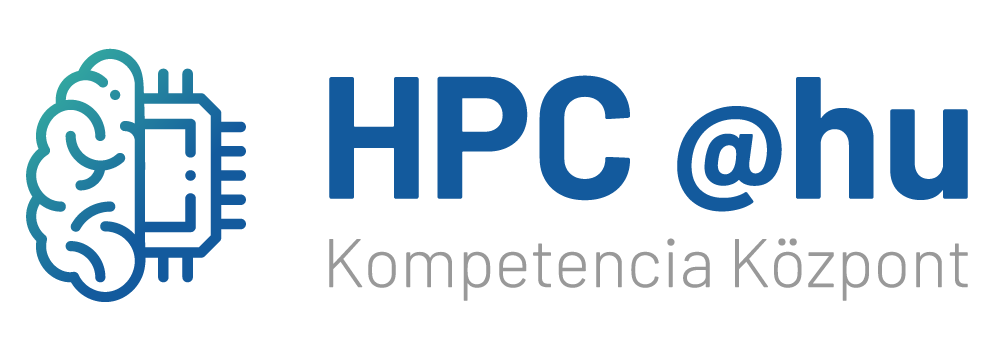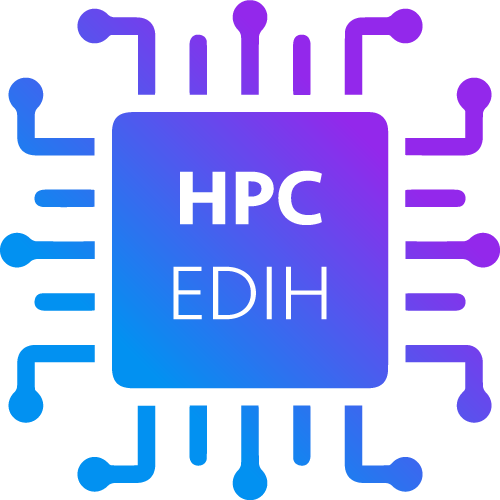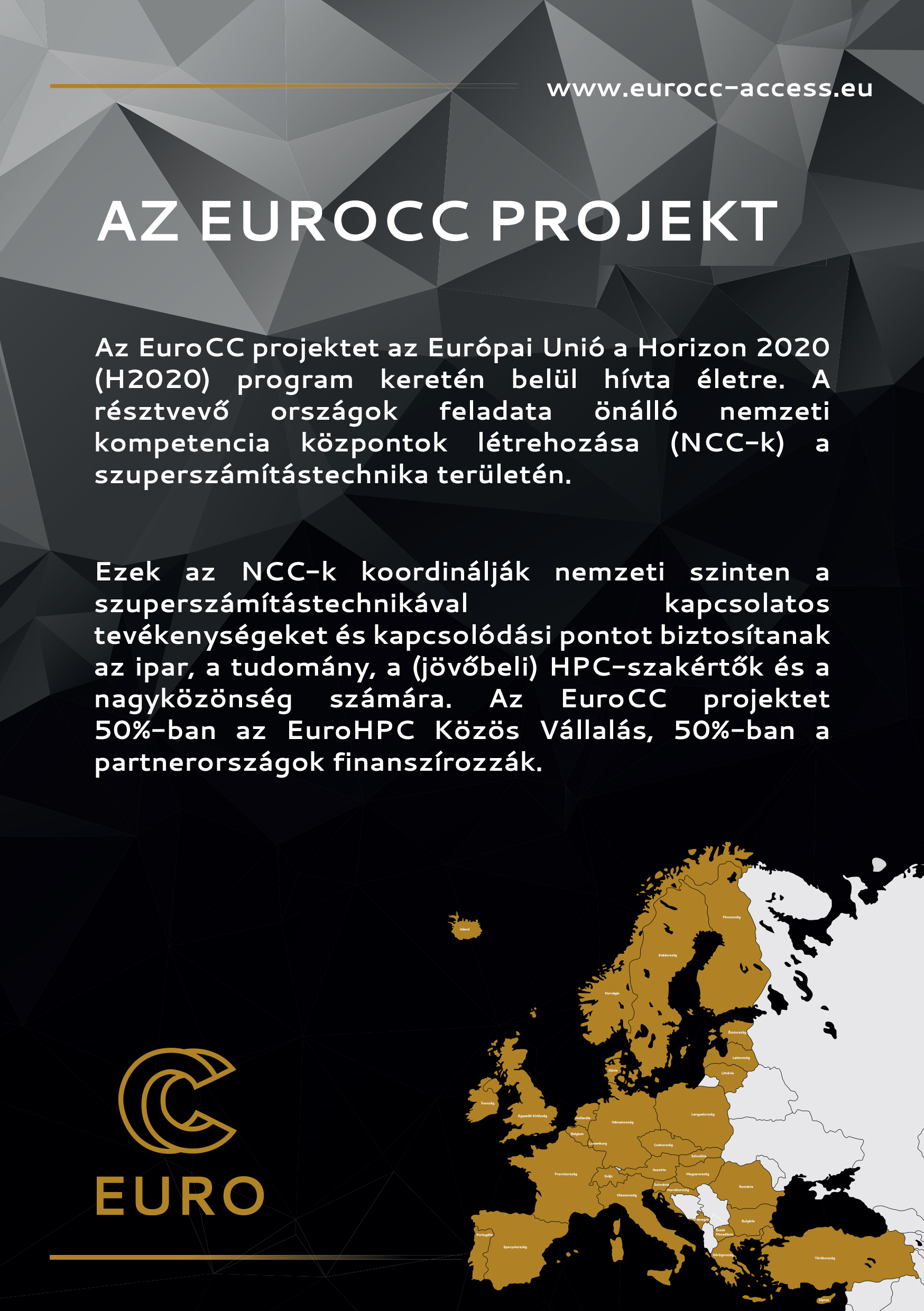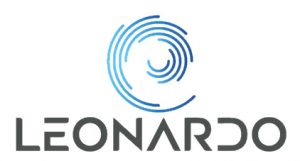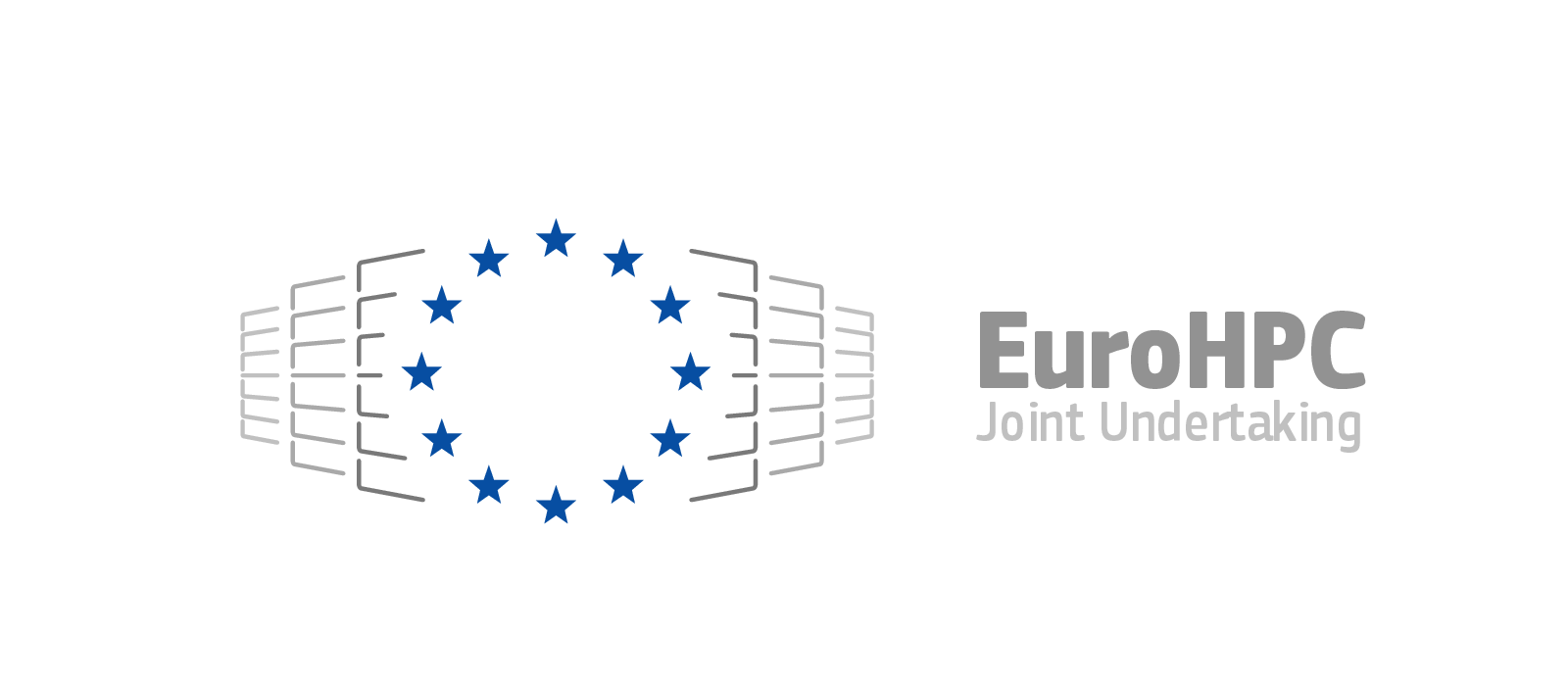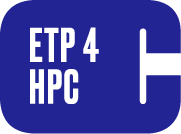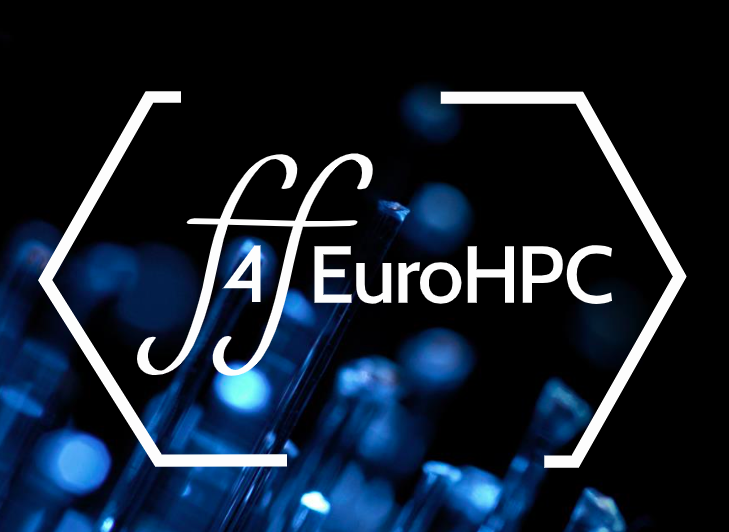The HPC Competence Centre liaisons with international professional partners and also represents the Hungarian HPC infrastructure and community at international professional forums. The HPC CC is an active participant in several international initiatives and projects.
The Hungarian HPC EDIH (Digital Innovation Hub promoting high-performance computing) was established in April 2023 in order to contribute to improve the digital maturity of businesses and the competitiveness of the European (Hungarian) digital economy. Its aim is to raise awareness of the benefits of high-performance computing (HPC) and to focus its activities for the benefit of SMEs, universities, public institutions and other bodies.
In the project, the Governmental Agency for IT Development (KIFÜ) is present as the consortium leader with two other consortium members: Bay Zoltán Non-profit (BZN) Ltd. (BZN) and KTI Hungarian Institute for Transport Sciences and Logistics Non Profit Limited Liability Company (KTI).
The task of the consortium leader and the members is twofold. On the one hand, they provide HPC services for small and medium-sized enterprises and public sector organizations, and on the other hand, they help partners in the efficient use of supercomputers with training, mentoring and consulting.
More information about the members of the consortium:
Governmental Agency for IT DevelopmentBay Zoltán Non-profit Ltd.
KTI Hungarian Institute for Transport Sciences and Logistics Non Profit Limited Liability Company
Summary of the market research
Communication Plan
HPC EDIH brochure
Interim Communication Report
Use cases
PRACE (Partnership for Advanced Computing in Europe) is a joint European supercomputer infrastructure and cooperation program established with support from the European Union. The main objective of PRACE is to ensure a world-class infrastructure for European research, development and innovation efforts free of charge, which guarantees Europe’s competitiveness in comparison with other developed regions of the world. One objective of PRACE is to improve its services, efficiency, and the quality of user support, and to enhance cooperation among European supercomputer centres.
The participation of DKF in the PRACE project is of vital importance because this provides a framework for gaining access to leading-edge European technologies, and for taking part in professional collaborations that are a fundamental prerequisite for maintaining and improving the quality of HPC services in Hungary.
Within the work packages, roles cover the following areas: dissemination of supercomputing culture and skills, and project outcomes; contribution to the organisational tasks related to PRACE events; and harmonisation and integration of the HPC services. These include:
- Planning of, and in-person participation at, events and appearances
- Improvement of web-based outlets for appearances
- Supervision of the PRACE services
- Development and operation of the training, event recording, and document repository portals
- Integration of DKF HPC into the international HPC infrastructure of PRACE
- Providing support to HPC users by optimising their applications
More information: https://www.prace-ri.eu/

Under the aegis of the EU Horizon 2020 (H2020), the responsibilities of countries participating in the EuroCC project include creating national HPC competence centres in their own countries. These centres coordinate all HPC-related activities on the national level and serve as points of contact for industrial players, the scientific community, (future) HPC experts, and the general public as well. The EuroCC Program is funded by the H2020 Program (EuroHPC Joint Undertaking) and the partner countries at a ratio of 50% to 50%. EuroCC has 33 members, and its activities are coordinated by the Stuttgart-based HLRS.
The role of this centre, which was established within KIFU, is to promote and popularise the HPC infrastructure among potential academic and industrial users, and to disseminate this technological culture. In Hungary, this is the centre that provides supercomputing services to domestic researchers and industrial players. User demands are evaluated and the resources of the national HPC infrastructure are managed by experts. In addition, the centre provides high-level user support, liaisons with domestic users and international professional partners, and also represents the Hungarian HPC infrastructure and community at international professional forums.
Under the framework of the EuroHPC Program, one of the most powerful supercomputers with a performance of 200 Pflops and named https://www.cineca.it/en/our-activities/data-center/hpc-infrastructure/leonardowill be completed by 2021 in Bologna with joint funding from the EU and Italy. Leonardo will be one of the 3 supercomputers with pre-exa performance in Europe (the other two being Lumi in Finland and Mare Nostrum 5 in Spain).
The Leonardo Project is funded by the EuroHPC JU on behalf of the EU and by the Ministry of Education and Research on behalf of Italy at a ratio of 50% to 50%. The project is being implemented by the Italian national supercomputer centre, CINECA. Furthermore, Austria, Slovenia, Slovakia, and Hungary are also official consortium members providing expertise for the project. Hungary is represented by KIFU in this project. Thus, the supercomputer capacities created will also be available for Hungarian users.
More information: https://www.cineca.it/en/our-activities/data-center/hpc-infrastructure/leonardo
Az EuroHPC JU (European High Performance Computing Joint Undertaking) is an international organisation established in 2018 and with headquarters in Luxembourg. Since 2020, the EuroHPC Joint Undertaking has been operating as an independent entity with its own budget, and has been led by the managing director.
The presence of innovative technologies, such as an HPC infrastructure, has a decisive impact on the competitive potential of countries. Upon recognising this, the EU declared the strategic importance of HPC in terms of the competitive potential and economic development of the EU as early as in 2012. The independent efforts of the individual member states proved insufficient in comparison with the US, China, and Japan. In 2017, the EU formulated a new strategic initiative for the period 2018 to 2026 under the designation ‘EuroHPC’, which builds upon the experience of the member states and on the successful HPC projects and cooperation efforts (PRACE) of the recent years; the objective of this initiative is to implement a new joint large-scale European program ensuring that EU countries could eliminate their disadvantages in terms of global competitiveness in the fields of R&D and innovation, and that the European scientific community and industrial players could enjoy at least as good conditions for accessing HPC resources as their US or Chinese counterparts. The goal was to build (and operate) two pre-exascale supercomputers by 2020, followed by two exascale supercomputers after 2020. The implementation was planned to rely on European technologies as much as possible. The total budget of the program (for the period 2019 to 2026) is EUR 1.2 billion, which is financed from three sources. The EU provides a direct support of EUR 486 million, to which the member states contribute with a similar amount, and the remaining funding is offered by industrial players.
This infrastructure does not replace national supercomputers but complements them with the top performance category, which is also available through remote access. In order to implement this program, the EU established a so-called Joint Undertaking (JU) to which the member states wishing to participate in the program can join. Hungary has also joined this initiative, and KIFU has been designated to represent the country. The following supercomputers have been purchased under the aegis of EuroHPC:
The purchase of the third supercomputer is still underway. This supercomputer will be installed in the Barcelona Supercomputing Centre The petascale supercomputers include:
- Discoverer–Sofia Tech Park, Bulgaria
- Karolina–IT4Innovations National Supercomputing Center, Czech Republic
- MeluXina–LuxProvide, Luxembourg
- Vega–IZUM, Slovenia
- Deucalion–Minho Advanced Computing Centre, Portugal
The responsibilities of EuroHPC include the development and maintenance of the European HPC ecosystem, the stimulation of the technological manufacturing sector (from low-consumption processors to software products and middleware, and the integration thereof into supercomputer systems), as well as making the HPC resources available in several fields of application for a large number of public and private users, including small and medium enterprises.
Through its research and innovation agenda, the EuroHPC JU strengthens the European knowledge base of HPC technologies and bridges over the lack of digital skills by establishing a network of national HPC competence centres (see EuroCC). These competence centres act on a national level with a view to facilitating access to the European HPC resources in various industrial sectors and offering custom solutions to a wide range of users. More information is available on the EuroHPC website.
ETP4HPC - the European Technology Platform (ETP) for High-Performance Computing (HPC) – is an industry-led non-profit association. The members of this association include large industries, small and medium enterprises and research centres from HPC manufacturers to HPC users. Its mission is to promote research and innovation in the field of HPC uses so that the European scientific community, industries and citizens may enjoy the economic and social benefits of HPC. The ETP4HPC summarises its recommendations on research priorities and program contents in a Strategic Research Agenda (SRA). This SRA is used by the EuroHPC Joint Undertaking to define the contents of the technical work programs.
The ETP4HPC is a member of the EuroHPC JU, and delegates several representatives to the Research and Innovation Advisory Group (RIAG).
The ETP4HPC is open to new members who would be willing to share their vision of the future and their objectives. More information on joining is available here.
The FF4EuroHPC is a European initiative that helps facilitate access to all high-performance computing-related technologies for SMEs and thus increases the innovation potential of European industries. Whether it is running high-resolution simulations, doing large-scale data analyses, or incorporating AI applications into SMEs´ workflows, FF4EuroHPC connects businesses with cutting-edge technologies.
The FF4EuroHPC project started in early September 2020 and will last three years. This project is funded by the European Commission within its H2020 framework program, with a total budget of EUR 9.9 million. The project is coordinated by the University of Stuttgart (USTUTT, DE), and is composed of 5 other partners: Scapos AG (DE), Teratec (FR), CINECA (IT), CESGA (ES) and Arctur (SI).
Within the FF4EuroHPC project, European SMEs can develop unique products and innovative business opportunities, and become more competitive by using European high-end HPC services. Two open calls will be offered through the project, targeting the highest quality experiments involving innovative, agile SMEs. Proposals will address business challenges from European SMEs from varied application domains. Experiments that will meet the open call standards will be carried out on the cloud-based HPC system, clustered in two tranches. The experiment is an end-user-relevant case study demonstrating the use of cloud-based HPC and the benefits it brings to the value chain from the end-user to the HPC-infrastructure provider and thus must address SME business problems by using HPC and complementary technologies such as HPDA (High Performance Data Analytics) and AI. When the experiment is successfully concluded, the case study is shared with the community. Should you be interested in this opportunity, find more information here.
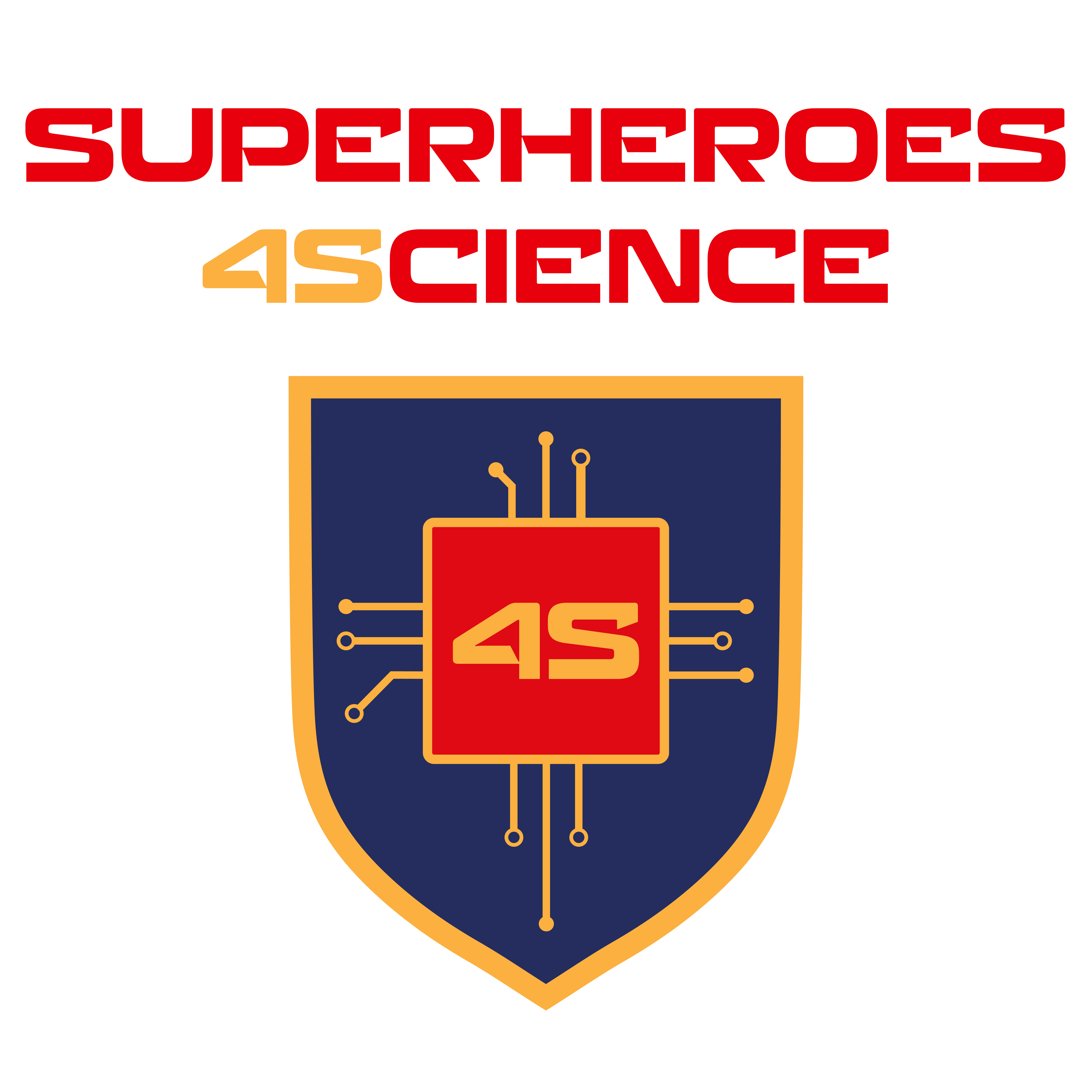
Superheroes 4 Science project plans to introduce the young generations to High-performance computing (HPC), a critical field of technology that utilises supercomputers to solve complex problems and perform computationally intensive tasks. The project aims to create various interactive educational materials on HPC and its two related emerging fields: Artificial Intelligence and Quantum Computing.
